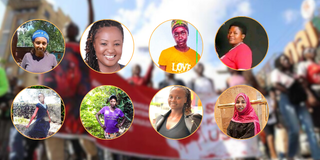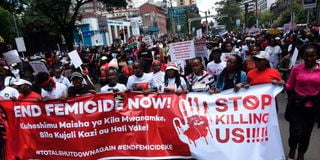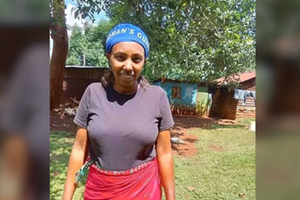
(Top from left) femicide victims Beth Muthoni, Marianne Kilonzi, Precious Nderema and Winnie Akusuha. (Bottom from left) Ashley Wairimu, Jane Wanjiru, Lydia Tokesi and Aisha Abubakar.
It started as an act, then became a habit. That habit seems to have become character, and risks becoming destiny.
While Ralph Waldo Emerson intended that evolution chain to inspire and better humanity, it has shown a morbid side, as Kenya grapples with a steep rise in murders targeting women.
In the first 22 days of the year alone, at least 15 women have been murdered, in what seems to be a continuation of a trend for close to 10 years.
The murder of a 14-year-old Grade Seven pupil in Garissa last Friday is an indication that even minors are not safe, as Kenya now risks having femicide as part of its character.
The suspected murder of Marianne Kilonzi, 43, who was found dead from blunt force trauma at her home in London on the same day, Friday last week, is an indication that it neither respects national borders nor social status.

Marianne Kilonzi
Beth Muthoni (41), Ashley Wairimu (13), Precious Nderema (13), Jane Wanjiru (26), Lydia Tokesi (29), Nancy Bonke (23), Winnie Akusuha (30), Loureen Omondi (20) and Aisha Abubakar (48) are some of the victims whose murders have been reported in the last three weeks alone.
Among the latest fatalities of the spiraling wave of macabre killings is Joy Fridah Munani, whose gruesome murder left police and Huruma residents reeling in shock.
Her husband John Kiama Wambua, 29, who was arraigned in Nairobi on Wednesday, was allegedly intercepted near Kelly Towers with her chopped body parts in a backpack on Tuesday morning as he fled the murder scene - their house in Huruma.
“Wambua, who appeared unperturbed by the discovery, led the officers to his house where the other body parts were recovered under his bed,” the Directorate of Criminal Investigations said.
“In the single room with a bloody floor of which no scene could be more horrendous, the officers also recovered a sharp knife and the victim's clothes soaked in blood.”
Also Read: Why femicide continues, and how to end it
Between January and November 2024, there were 172 reported femicide cases. That was 22 more lives lost than the previous year, where at least 150 murders targeting women were reported.

Femicide victims from left: Vivian Kajaya, Eileen Cherotich, Seth Nyakio and Rita Waeni.
A UN report showed that on average, 47 women are killed in Kenya each week, mostly by people familiar to them.
Romantic partners, close family members and friends - people well-known to the victims - have been the culprits or suspects in most reported femicide cases.
The legal system has made attempts to deter gender-based crimes as some judges have handed out lengthy prison terms, recognised femicide as a threat to Kenya’s moral fabric, and taken a tough stance against the evil even in cases where the murderers pleaded guilty.
And yet, the numbers keep going up.
Uproar
The handling of many femicide cases, however, has caused uproar in civil society and public spaces, with many feeling that enough is not being done by crime busters and prosecutors to bring perpetrators to book.

Women in Nairobi take part in a protest dubbed 'Feminist march against femicide' on January 27, 2024, to protest against the rising femicide across the country in recent months.
Many suspects roam free, and in some cases there are no suspects at all, leaving questions on whether investigative agencies are equipped to keep up with killers and murderers on the loose.
For instance, police are still searching for Lydia Tokesi’s boyfriend, who is the prime suspect in her January 4 murder.
Collins Jumaisi Khalusha, whom the DCI said is the prime suspect in the murder of at least 42 women whose bodies were dumped in an abandoned quarry in Kware, Nairobi, is still missing after escaping from a Gigiri Police Station cell in August 2024.
In January 2024, Director of Criminal Investigations Mohamed Amin released a statement to the effect that only 94 femicide cases had been reported in the last three years, and that 65 suspects had been presented in court.
The numbers contradicted independent data collection reports, including those by media outlets, which based their figures on cases reported to the police.
Mr Amin, however, said that a special unit was to be formed to fast-track the investigation of femicide cases.
On Wednesday, Inspector-General of Police Douglas Kanja and newly appointed spokesperson Michael Muchiri did not comment on the status of investigations and preventive action by security agencies when the Nation reached out.
Mr Muchiri declined to comment on the matter, saying he was yet to take over the office that was left vacant following the transfer and appointment of Resila Onyango as Commandant of the Diplomatic Police Unit.
A 34-member taskforce formed to combat the rising femicide cases, and which is led by former deputy Chief Justice Nancy Baraza will be sworn in next Monday. Justice Baraza’s team will be expected to suggest a solution to President William Ruto within 90 days.
The taskforce is expected to identify gaps in prevention, response, investigations, prosecution, data management and survivor support systems, and recommend the way forward, through a report. President Ruto formed the taskforce through a Gazette notice on January 18, 2025.
In the meantime, civil society groups agree that the legal system - laws and jailing of offenders - is just one limb of combating the crisis, as more needs to be done at the social level.
“The main focus should be on the social level. Law can be prescribed, but if the society does not see it as an issue, there will be little impact. There is a need to sensitise the society, and it should start at the grassroots level, in schools and at home,” Nelius Njuguna, a Kenya Human Rights Commission legal adviser said in an interview.
“Imprisoning is not acting as a deterrent, it (femicide crisis) should be looked at from a mental health aspect. People do not know how to regulate their emotions. There is a need to consider mental health and wellness when assigning budgets (at national and county government level), and to institutionalise mental health.”
Fida-Kenya executive director Anne Ireri holds that femicide and gender-based violence must first be recognised as endemic, and cutting across all sections of society, to catalyse meaningful national discussions that will quell the crisisShe said that more resources must be channelled to police, prosecutors and the Judiciary to ensure proper investigation and prosecution cases.
“We should not have GBV or femicide cases taking over three months in court. Government must supplement the resourcing of non-governmental organisations and community-based organisations who undertake the vital advocacy initiatives.
"They have been undertaking this for decades without much support from government. There should be ways of enhancing the role of non-State actors who are at a community level to allow better prevention and response,” Ms Ireri added.













